SPORTING A HELMET, goggles and a respirator, the uniform of Hong Kong’s anti-government protesters, Lady Liberty raises her left arm to the sky—or rather, to the ceiling (see below). She is the newest version of a crowdfunded, 3D-printed sculpture which became a totem during last year’s unrest, The Economist reports:
Conceived and constructed in just one week, the original waved a flag demanding “Revolution Now”. (It also draws on a tradition established by protesters on Tiananmen Square in 1989, who erected a statue made from foam, metal and papier-mâché called the “Goddess of Democracy”.) The new model, in brilliant white, has been designed to fill a small gallery space above a “yellow” (pro-democracy) café in Kowloon, holding up the roof to represent the determination of Hong Kongers.
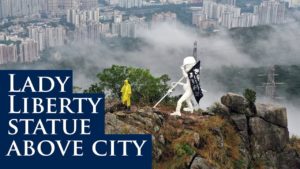
HK Lady Liberty/YouTube screen capture
Hong Kong police arrested at least 300 people during day-long protests and skirmishes across the city, as residents railed against controversial legislation aimed at bringing the territory further under Beijing’s control. Police fired pepper-spray bullets into lunchtime crowds as people shouted slogans. Officers stopped and searched residents, including students, and rounded up suspected protesters, forcing them to sit in rows on the ground, the Guardian adds (above).
Beginning of the end
When asked if the U.S. is still capable of affecting Hong Kong’s trajectory, Lynette Ong, an expert on China and authoritarian politics at Toronto’s Munk School, hesitated. “Maybe. Maybe, possibly,” she told CBC.
“I hate to say this, but I think it’s the beginning of the end of Hong Kong’s uniqueness.”
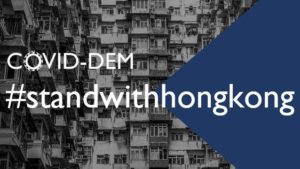 The commander of China’s military garrison in Hong Kong said that forces stationed there would “resolutely” protect the country’s national security interests. It was a reminder of Beijing’s power in the semi-autonomous territory, The Times reports. Steven Lee Myers, NYT Beijing bureau chief, said the mainland government’s move amounted to “rattling the saber,” but added that it was “certainly a chilling message.”
The commander of China’s military garrison in Hong Kong said that forces stationed there would “resolutely” protect the country’s national security interests. It was a reminder of Beijing’s power in the semi-autonomous territory, The Times reports. Steven Lee Myers, NYT Beijing bureau chief, said the mainland government’s move amounted to “rattling the saber,” but added that it was “certainly a chilling message.”
Prominent pro-democracy activist Joshua Wong called Beijing’s proposed national security legislation “more evil” than the scrapped extradition bill that triggered mass protests in Hong Kong last year. ″We all know that the national security legislation is not about the security of China, it’s just about enhancing, embracing the Communist regime in China,” Wong, secretary general of pro-democracy group Demosisto, told CNBC.
Wong slammed that process, saying “This proposed law is a stepping stone for the future interference of eroding the political and economic freedom in Hong Kong.”
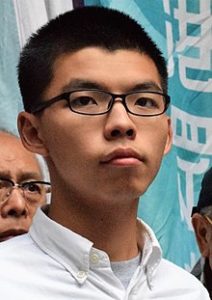
Joshua_Wong/Wikipedia
“It’s like a de facto curfew now,” former lawmaker and pro-democracy activist Nathan Law told Hong Kong public broadcaster RTHK in the wake of the arrests. “I think the government has to understand why people are really angry,” he added.
“Hong Kong is an important place, sustained by its international status. I think there is room to organize and oppose these actions,” Law told The Wall Street Journal. “Although all this is very scary because we, the high profile activists, are the ones being targeted.”
“The situation in Hong Kong, from Beijing’s viewpoint, was steadily getting worse, despite the pause in protests occasioned by Covid-19,” China expert Jerome Cohen wrote this week. “If allowed to fester without any attempt to suppress it, prospects for the autumn promised to see Hong Kong move further out of PRC control.”
Protests returned to the streets of the Chinese-ruled city after Beijing proposed national security laws last week that sparked global fears that China is intent on ending the freedoms that have made the city a financial powerhouse, Reuters reports.
 “This is the nuclear option: Beijing’s ultimate power to impose whatever it wants on Hong Kong, outside and above Hong Kong’s constitutional, political and legal structure,” said Antony Dapiran, a lawyer who has written two books on Hong Kong’s protest culture.
“This is the nuclear option: Beijing’s ultimate power to impose whatever it wants on Hong Kong, outside and above Hong Kong’s constitutional, political and legal structure,” said Antony Dapiran, a lawyer who has written two books on Hong Kong’s protest culture.
Hong Kong’s rule of law, which includes an independent judiciary, is one of the crucial factors that distinguishes it from mainland China. But the draft law instructs the territory’s judiciary to “effectively prevent, stop and punish acts endangering national security”. This suggests Hong Kong’s judges will be instructed by the Chinese Communist party to act in certain ways, undermining the city’s rule of law, he writes for The FT:
[T]he unilateral introduction of national security legislation by Beijing in Hong Kong… is a comprehensive assault on the city’s autonomy, rule of law, and fundamental freedoms. The integrity of one-country, two-systems hangs by a thread. …If the international community cannot trust Beijing to keep its word when it comes to Hong Kong, people will be reluctant to take its word on other matters. Sympathetic governments must unite to say that this flagrant breach of the Sino-British Joint Declaration cannot be tolerated.
“Hong Kong is purely China’s internal affair,” Foreign Ministry spokesman Zhao Lijian said in Beijing on May 27, promising to take “necessary countermeasures” against any “interference” by “external forces.” China said it would sanction some U.S.-based activist groups including the National Endowment for Democracy (NED), Human Rights Watch and Freedom House, and suspend port visits by U.S. Navy ships to Hong Kong, The Post adds.
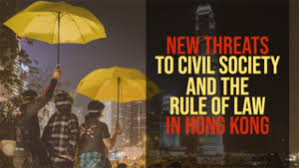
National Endowment for Democracy
Beijing is flexing its muscles in Hong Kong as part of a strategy for regime renewal and resilience, as laid out in “A Theoretical Guideline and Action Plan for the Rejuvenation of the Chinese Nation,” a 2017 article in the Chinese Communist Party journal Qiushi, one of the most influential publications in the country, CNN adds:
Since becoming leader, national rejuvenation has been a key priority for President Xi Jinping. Once, the Communist Party’s compact with the Chinese people was that it would make them rich, under Xi the deal has been that it will make them great. No one expects this to be easy, or to go unopposed.
“As China enters a crucial stage of its transformation from a major country to a powerful one,” Qiushi noted, “it is encountering growing pressure and obstruction on the path ahead.”
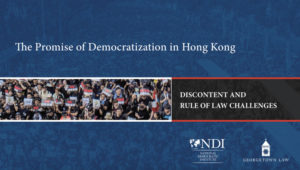 “The world is currently witnessing unprecedented changes as major shifts occur in the international strategic landscape, the global governance system, the global geopolitical landscape, and the competition among countries over national strength,” the journal said.
“The world is currently witnessing unprecedented changes as major shifts occur in the international strategic landscape, the global governance system, the global geopolitical landscape, and the competition among countries over national strength,” the journal said.
More than 200 parliamentarians and policymakers from two dozen countries signed an open letter last week slamming the anti-sedition bill as a “comprehensive assault on the city’s autonomy, rule of law, and fundamental freedoms.”
One of the leading signatories of that letter, Chris Patten, the last colonial governor of Hong Kong, told CNN that “the Communist party of China which has broken its word about so many international agreements, is driving a coach and horses through the international agreement that it reached with Britain: a treaty lodged with the United Nations, to safeguard Hong Kong’s high degree of autonomy, its rule of law and its freedom for 50 years after 1997. And it’s simply tearing that agreement up.”







